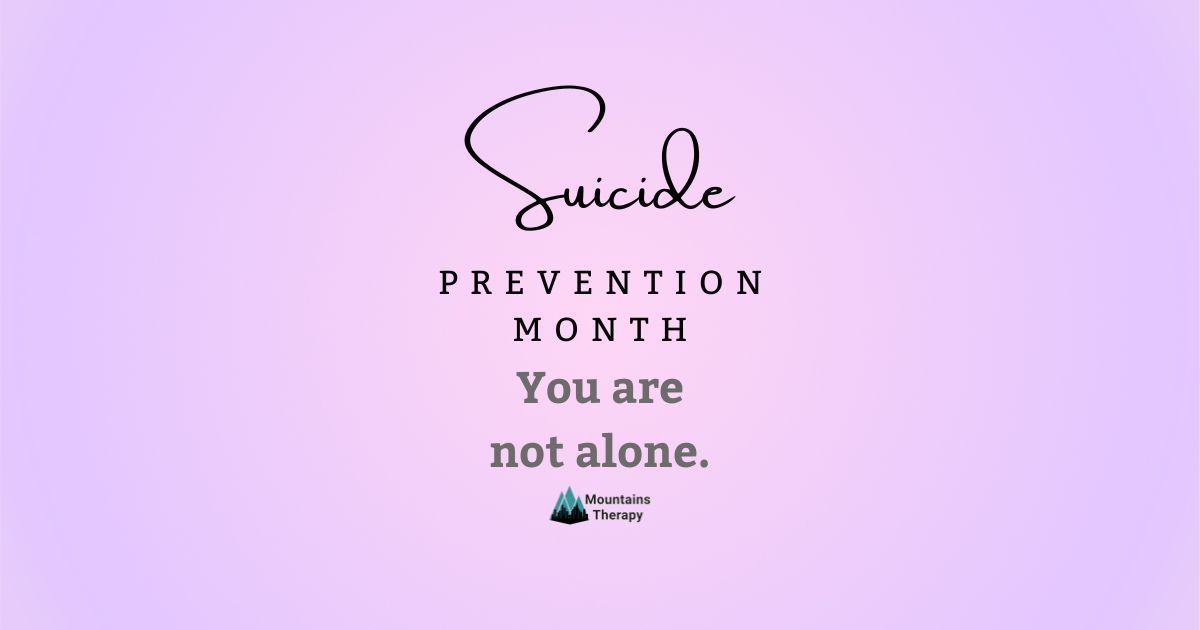National Suicide Prevention Month: How to Support Loved Ones and Reach Out for Help
Learn more about Individual Therapy, Anxiety Therapy, Depression Therapy, Trauma Therapy and Grief Therapy here.
September is National Suicide Prevention Month, a time dedicated to raising awareness about the importance of mental health, reducing the stigma around suicide, and offering support to those in need. At Mountains Therapy, we believe that understanding how to help someone who may be struggling and knowing where to turn for help is crucial in saving lives. Below are some tips for supporting loved ones and ways to seek assistance, including the National Suicide Prevention Lifeline, which is available by texting or calling 988.
Recognizing the Warning Signs
Recognizing when a loved one is struggling can be challenging, but there are several warning signs that may indicate someone is at risk. These include:
- Talking about feeling hopeless, trapped, or having no reason to live
- Increased isolation and withdrawal from friends, family, or activities
- Extreme mood swings or changes in behavior, such as increased anger or irritability
- Talking about being a burden to others
- Increased use of alcohol or drugs
- Sleeping too little or too much
If you notice these signs in someone, it’s essential to approach the situation with care and understanding. Often, people in crisis just need to know that someone cares. Counseling services, such as trauma counseling or grief counseling, can provide additional support.
How to Help a Loved One
If you suspect a loved one may be struggling with suicidal thoughts, here are ways you can help:
1. Start a Conversation
It can be difficult to know what to say, but simply starting a conversation can make a significant difference. Express concern without judgment and let them know you’re there to listen. For example, you might say, "I've noticed that you seem down lately. Is there anything you’d like to talk about?"
2. Be Present
Being there for someone can provide immense comfort. Sometimes, offering your time and presence, whether through a phone call, text, or in-person visit, shows that they are not alone.
3. Encourage Professional Help
While offering emotional support is vital, it's equally important to encourage seeking professional help. Counseling and therapy services, such as individual therapy, marriage counseling, or cognitive behavioral therapy (CBT), can help individuals manage emotions and challenges. Mountains Therapy offers both Online Therapy and In-Person Therapy options to support those who need it.
4. Check-In Regularly
One conversation may not be enough. Keep checking in to show that you genuinely care and that your concern isn’t temporary. A simple message like, "Just checking in to see how you’re doing today," can go a long way.
5. Provide Resources
Make sure your loved one knows where they can go for help. Mountains Therapy is also here to provide mental health therapy, including cognitive behavioral therapy (CBT), to help individuals navigate their challenges. Mountains Therapy also offers guidance for navigating mental health therapy, including trauma-focused counseling, relationship therapy, and support for overcoming addiction.
- The National Suicide Prevention Lifeline, available at 988, is free and confidential, offering 24/7 support.
Taking Care of Yourself
Supporting someone through a crisis can be emotionally exhausting, and it's important to prioritize your own mental health counseling needs. Consider reaching out to a licensed professional counselor or exploring self-care therapy options. Taking care of your well-being ensures you have the energy and resources to support others. Self-care may include mindfulness practices, setting boundaries, or connecting with a therapist near you.
Reaching Out for Support
If you or someone you know is struggling with suicidal thoughts, it’s important to reach out for help. In addition to calling 988, you can also:
- Visit the Mountains Therapy contact page to learn more about our mental health services.
- Book an appointment for a free 15-minute consultation to explore how therapy can help.
- Reach out to local mental health therapists, anxiety therapists, anxiety counselors, depression therapists, depression counselors, relationship counselors, and relationship therapists for specialized support. These professionals can provide targeted assistance to address specific challenges and help individuals navigate their unique journeys toward mental well-being.
You Are Not Alone
Remember, you don’t have to go through difficult times alone, and help is always available. National Suicide Prevention Month serves as a reminder that reaching out for support is a sign of strength, not weakness. Whether you're concerned about a loved one or struggling yourself, don’t hesitate to seek help.
At Mountains Therapy, our licensed therapists and counselors specialize in offering compassionate care tailored to your unique needs. From cognitive behavioral therapy (CBT) to online therapy services, we are here to help you on your journey to healing and growth. Contact us today to book an appointment or learn more about how we can support your mental health.











